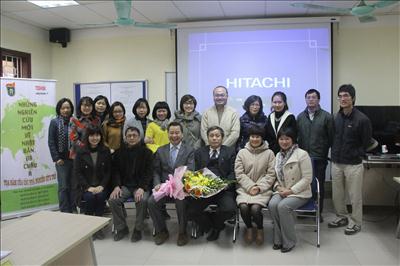
The seminar’s representatives joined and discussed two scientific papers by Dr. Nham Thi Ly and Ma. Tran Thi Quynh Trang (Faculty of Oriental Studies).
The report “The interdependence in the Chinese community in Vietnam through Chinese letters’ data survey” was presented by Dr. Nham Thi Ly. It analyzed the content of Chinese letters’ data such as documents, ordainment, parallel sentences,…. As Vietnam belongs to South East Asia, a gateway of international trade routes, it has had trade relations with other countries in the region for a long time. Since the 16th and 17th centuries, some groups of Chinese traders appeared in many coastal areas in Vietnam for temporary residence. From the late Le dynasty, the Nguyen lords in Cochinchina made favorable conditions for the Chinese to settle for a long time and operate commercial activities in this area. By examining the existing Chinese letters of the Chinese in Vietnam, this report showed that the interdependence is a common feature in the Chinese community’s activities. Through community cultural village activities and rituals in social premises, the Chinese took care, protected, and helped each other. Interdependence and solidarity helped promote the role of Chinese society, the prestige of the community and maintained its economic position in their own country where they reside.
Commenting on this report, Dr. Vo Minh Vu (Faculty of Oriental Studies) said that this study used a resource that in previous studies rarely used, which are ordainments, panels, parallel sentences materials. The report studied one of the very basic problems in studying Chinese: interdependence - a manifestation of the nature of network, which is considered as characteristic of the Chinese community. However, the commentator also said although the author had lots of analysis of interdependence in each society’s premises, it was just the individual analysis of textual content rather than diachronic and synchronic comparison. If the documents were compared diachronically, the writer could have rebuilt the image of Chinese society in the past and present, the relations among groups, or groups and the country of the Chinese people there.
The second report in the seminar was “Trade and investment relations between Thailand and Vietnam in the first five years of the twenty-first century (2001-2005)”, presented by young researcher Tran Thi Quynh Trang. This report considered that in the first five years of the twenty-first century, the trade and investment relations between Thailand and Vietnam achieved remarkable results. The interdependent economic relationship in general and trade - investment in particular between Vietnam and Thailand was not only manifested clearly at governmental level but also spread to private enterprises. This report researched deeply the causes, achievements and challenges in trade - investment relations between the two countries, and appraised the impact and effect of this relationship on economic development and friendly cooperation between the two countries in the present and the future.
Asso.Prof.Dr. Nguyen Duy Dung (Institute of Southeast Asian Studies, Vietnam Academy of Social Sciences) commented: the researcher attempted to clarify the current status of trade - investment relations between Vietnam and Thailand during 2001-2005 period and thus helped to identify the development of bilateral relations in the past. However, the commentator also suggested the researcher should have raised the comparison to clarify the main points of the relations between the two countries at this stage: their limits, the hindrances..compared to those in other periods.

Assoc. Prof. Dr Pham Quang Minh chairs the seminar

Assoc. Prof. Dr Pham Quang Minh takes a ceremonial picture with the participants
This seminar was one of the academic activities for young researchers at Faculty of Oriental Studies. It aimed to publish the results of new studies on Japan and Asia, as well as create a platform for young researchers to learn and trade experiences in order to improve their research capacity. It was sponsored by Toshiba Fund (Japan).
Author: Thanh Ha
Reader Comments
Newer articles
Older articles